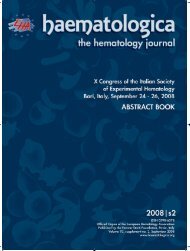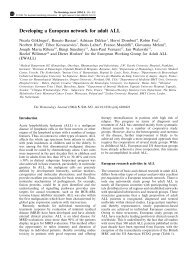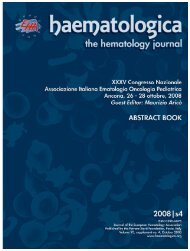- Page 1 and 2:
haematologica the hematology journa
- Page 3 and 4:
Information for readers, authors an
- Page 5 and 6:
EHA Executive Board E. Hellström-L
- Page 7 and 8:
Poster session I POSTER SESSION POS
- Page 9 and 10:
12 th Congress of the European Hema
- Page 11 and 12:
dasatinib. Methods. We studied Ikar
- Page 13 and 14:
Expression of the oncogene H-Ras an
- Page 15 and 16:
is the gene for the erythropoietin
- Page 17 and 18:
safety of a slow-release liposomal
- Page 19 and 20:
0029 OUTCOME OF THE TREATMENT OF AD
- Page 21 and 22:
drug-induced apoptotic response of
- Page 23 and 24:
41% in the PI3K- group (p=0.001). I
- Page 25 and 26:
Acute myeloid leukemia - Clinical I
- Page 27 and 28:
to 60 years (n=116, or 72%) receive
- Page 29 and 30:
0056 PROGNOSTIC SIGNIFICANCE OF FLT
- Page 31 and 32:
Anemia and Bone marrow failure 0061
- Page 33 and 34:
tified with the current protocol. S
- Page 35 and 36:
new cases of lead poisoning due to
- Page 37 and 38:
icance, from baseline to week 6 (p
- Page 39 and 40:
0086 THROMBELASTOGRAPHIC CHART RELI
- Page 41 and 42:
trials. The aim of this retrospecti
- Page 43 and 44:
tant function in this disease, nega
- Page 45 and 46:
ed to a favorable outcome. Bialleli
- Page 47 and 48:
stronger levels of p21 in the cell
- Page 49 and 50:
hematological centers in one countr
- Page 51 and 52:
ure 1). Conclusions. Results for re
- Page 53 and 54:
patients. After a median follow-up
- Page 55 and 56:
Cytogenetics and Molecular diagnost
- Page 57 and 58:
0135 ROUTINE DETECTION OF CYTOGENET
- Page 59 and 60:
(MMolR, defined as a BCR-ABL x 100
- Page 61 and 62:
0146 ARSENIC TRIOXIDE INDUCES ACCUM
- Page 63 and 64:
tinguish between genotypic B-cell l
- Page 65 and 66:
Genomics and proteomics 0158 PLASMA
- Page 67 and 68:
0164 EVALUATION OF MULTIPLEX LIGATI
- Page 69 and 70:
each patient’s replicate conditio
- Page 71 and 72:
0174 RELATION BETWEEN LOW PML-RARα
- Page 73 and 74:
0179 ESHAP VS GIN AS SALVAGE AND MO
- Page 75 and 76:
Immunology and gene therapy 0184 EA
- Page 77 and 78:
Cell viability was not affected by
- Page 79 and 80:
month is not relevant to chronic Gv
- Page 81 and 82:
Infection and supportive care I 020
- Page 83 and 84:
0206 POTENTIAL ROLE OF CMV IN THE O
- Page 85 and 86:
3H-thymidine uptake in cell culture
- Page 87 and 88:
0217 TUBERCULOSIS AMONG A COHORT OF
- Page 89 and 90:
0222 COMPARISON OF IWG 2006 AND IWG
- Page 91 and 92:
tem (IPSS) to h-MDS was also invest
- Page 93 and 94:
PCH97-19) were studied. Conventiona
- Page 95 and 96:
of erythroid colonies was reduced i
- Page 97 and 98:
0245 POTENT AND SELECTIVE INHIBITIO
- Page 99 and 100:
0250 INACTIVATION OF SUPPRESSOR OF
- Page 101 and 102:
Bortezomib 1.3 mg/m 2 days 1,4,8,11
- Page 103 and 104:
Response was defined according to E
- Page 105 and 106:
G-CSF can be used in neutropenic pa
- Page 107 and 108:
ence and functional activity of CD8
- Page 109 and 110:
itating tumor development, or engag
- Page 111 and 112:
phoma and SNT-13, -15 were establis
- Page 113 and 114:
usage (2/20 ie 10%) were observed.
- Page 115 and 116:
0294 MYCOSIS FUNGOIDES. IMMUNOHYSTO
- Page 117 and 118:
(range, 1-6) and 11 treatment cycle
- Page 119 and 120:
0306 RISK-ADAPTED IMMUNOCHEMOTHERAP
- Page 121 and 122:
functional activity was confirmed b
- Page 123 and 124:
No major toxicity, neither hematolo
- Page 125 and 126:
enewal potential of X-RAR-positive
- Page 127 and 128:
(50-99) respectively. Serial analys
- Page 129 and 130:
cell-interaction, adhesion and acti
- Page 131 and 132:
0340 ALTERED FIBRIN CLOT STRUCTURE
- Page 133 and 134:
Conclusions. This study demonstrate
- Page 135 and 136:
0354 FACTOR V LEIDEN HOMOZYGOUS GEN
- Page 137 and 138:
Results. From July 2005 through Mar
- Page 139 and 140:
0364 CLINICAL EFFICACY OF OXALIPLAT
- Page 141 and 142:
one marrow and peripheral blood ste
- Page 143 and 144:
ecently suggested (Boissel et al.,
- Page 145 and 146:
0378 SAFETY AND EFFICACY OF THE TER
- Page 147 and 148:
Cytogenetics and molecular diagnost
- Page 149 and 150:
0385 CYTOPLASMIC MUTATED NUCLEOPHOS
- Page 151 and 152:
0390 ELTROMBOPAG RAISES PLATELET CO
- Page 153 and 154:
factor for the achievement of CR wa
- Page 155 and 156:
The cases of RAS showed two peaks o
- Page 157 and 158:
is 85%. Seven out of the 25 relapse
- Page 159 and 160:
0409 FRACTIONATED RADIOIMMUNOTHERAP
- Page 161 and 162:
0414 COMPARATIVE ANALYSIS OF THE CO
- Page 163 and 164:
successfully managed with GM-CSF di
- Page 165 and 166:
49% for PCR positive patients (95%
- Page 167 and 168:
+8 (1 PR+1 HI) and 14/24 pts with c
- Page 169 and 170:
(e.g. bcr-abl leading to CML). CSC
- Page 171 and 172:
0438 TERC MUTATIONS ANALYSIS IN PAT
- Page 173 and 174:
observed in all mice. Analysis of l
- Page 175 and 176:
ex-vivo expansion of HUCB-derived H
- Page 177 and 178:
ic kidney disease in univariate or
- Page 179 and 180:
One hundred eleven CN AML patients,
- Page 181 and 182:
to asses intestinal epithelial dama
- Page 183 and 184:
genesis of acute myeloid leukaemia
- Page 185 and 186:
polymorphism at nucleotide 4889 of
- Page 187 and 188:
expression along with a decreased C
- Page 189 and 190:
0487 MUTATIONAL STATUS OF NUCLEOPHO
- Page 191 and 192:
previously reported, a single cours
- Page 193 and 194:
0497 SINGLE AGENT CLORETAZINE (VNP4
- Page 195 and 196:
ly received melphalan-based chemoth
- Page 197 and 198:
were similar among the 3 groups. Ho
- Page 199 and 200:
Methods. Several read-out systems w
- Page 201 and 202:
0518 SERUM AND CELLULAR EXPRESSION
- Page 203 and 204:
0523 DNA REPAIR INHIBITION IN RESTO
- Page 205 and 206:
held true when BMI-1 expression was
- Page 207 and 208:
Ph + cells in the bone marrow). We
- Page 209 and 210:
derivative chromosome (4p16, 7p14,
- Page 211 and 212:
0545 STABILIZED BONE MARROW IS NOT
- Page 213 and 214:
obtained in low (Sokal) risk patien
- Page 215 and 216:
median dose intensity being 800 (21
- Page 217 and 218:
from pivotal clinical trials. Metho
- Page 219 and 220:
Cytogenetics and Molecular diagnost
- Page 221 and 222:
to set up and optimize a D-HPLC-bas
- Page 223 and 224:
0576 WESTERN BLOT IDENTIFICATION OF
- Page 225 and 226:
Basic disease was AML (n=5), ALL (n
- Page 227 and 228:
0588 EXTRACORPOREAL PHOTOPHORESIS F
- Page 229 and 230:
acquire a cytolytic capacity agains
- Page 231 and 232:
informed vignettes describing healt
- Page 233 and 234:
using CHOP-21 in the UK, pegfilgras
- Page 235 and 236:
0609 SOFT TISSUE COMPLICATIONS IN P
- Page 237 and 238:
inding lectin (MBL) gene by polymer
- Page 239 and 240:
all infection rate (p=0.12) as well
- Page 241 and 242:
Myelodysplastic syndromes II 0623 M
- Page 243 and 244:
formation (in total 28 samples). Ti
- Page 245 and 246:
sion. In addition, confocal analysi
- Page 247 and 248:
Myeloproliferative disorders - Clin
- Page 249 and 250:
open-label, multi-centre study enro
- Page 251 and 252:
iopsies after 6 and 12 months treat
- Page 253 and 254:
Myeloproliferative disorders Chroni
- Page 255 and 256:
ash, muscolar cramps, diarrhoea, he
- Page 257 and 258:
induced significant apoptosis (mean
- Page 259 and 260:
Myeloma and other monoclonal gammop
- Page 261 and 262:
the therapy of choice for POEMS is
- Page 263 and 264:
er patient does not indicate such t
- Page 265 and 266:
Myeloma and other monoclonal gammop
- Page 267 and 268:
secutive patients with MM, referred
- Page 269 and 270:
whether gene expression values may
- Page 271 and 272:
0705 THE SHIFT OF TREATMENT FOR NAS
- Page 273 and 274:
0710 CLINICO-PATHOLOGICAL FEATURES,
- Page 275 and 276:
patients presented a stage IV disea
- Page 277 and 278:
plete remission or recurrent diseas
- Page 279 and 280:
known at NHL diagnosis, were includ
- Page 281 and 282:
0731 THE IMPACT OF HIV ON NON-HODGK
- Page 283 and 284:
patients had died of their underlyi
- Page 285 and 286:
scripts and proteins most affected
- Page 287 and 288:
modulated after 24 h (37 up- and 59
- Page 289 and 290:
0753 A SUSTAINED REMISSION OF IDIOP
- Page 291 and 292:
and treatment, has rarely been syst
- Page 293 and 294:
uncontrolled massive bleeding affec
- Page 295 and 296:
Results. A total of 396 patients we
- Page 297 and 298:
C30 questionnaire, and the correspo
- Page 299 and 300:
wave length of light of reflected r
- Page 301 and 302:
0783 PREVALENCE OF MEMBRANE PROTEIN
- Page 303 and 304:
erozygous mother has a more severe
- Page 305 and 306:
0794 CARDIAC MANIFESTATIONS IN A BR
- Page 307 and 308:
0799 INEFFECTIVE ERYTHROPOIESIS IN
- Page 309 and 310:
p=0.014 and p=0.003, respectively).
- Page 311 and 312:
0809 CURRENT APPROACH TO CHELATION
- Page 313 and 314:
Thrombosis II 0814 UNSUSPECTED PULM
- Page 315 and 316:
the 97.5th percentile (5.2 U/mL) ge
- Page 317 and 318:
symptoms of DVT, 3 (7.89%) previous
- Page 319 and 320:
Transfusion medicine and vascular b
- Page 321 and 322:
tions (most bacterial, 2 malaria, 6
- Page 323 and 324:
0844 INCREASED LEUKOCYTE-PLATELET I
- Page 325 and 326:
0851 CORD BLOOD DERIVED MESENCHYMAL
- Page 327 and 328:
SIMULTANEOUS SESSION II Chronic mye
- Page 329 and 330:
0862 COMPARISON OF DASATINIB TO HIG
- Page 331 and 332:
0867 COMPREHENSIVE GERIATRIC ASSESS
- Page 333 and 334:
0872 MN1 INDUCES LEUKEMIA IN MICE A
- Page 335 and 336:
0877 PAX5/TEL TRANSDUCED PRE-BI CEL
- Page 337 and 338:
0882 CISPLATIN INDUCES THROMBIN GEN
- Page 339 and 340:
have an early manifestation of typi
- Page 341 and 342:
0892 INTEGRATION OF GENOME WIDE SNP
- Page 343 and 344:
0897 THE PHENOTYPE OF JAK2V617F MUT
- Page 345 and 346:
gest diverse sequences of NPM mutan
- Page 347 and 348:
2004 to January, 2006. At enrollmen
- Page 349 and 350:
with a p value of ≥ 0.10. Sets of
- Page 351 and 352:
BRIC 126 and 4N1K) in cells lacking
- Page 353 and 354:
sclerosis[NS] and 12 Mixed cellular
- Page 355 and 356:
0927 MK-0457, A NOVEL MULTIKINASE I
- Page 357 and 358:
Publication Only 0933 CLINICAL FEAT
- Page 359 and 360:
HSCT from the available Asian as we
- Page 361 and 362:
that the incidence of JAK2 mutation
- Page 363 and 364:
without type 2 diabetes. Methods. T
- Page 365 and 366:
pts (38.8%) that were isolated (abs
- Page 367 and 368:
y using the Miltenyi CD34 isolation
- Page 369 and 370:
0969 COMPARISON OF CD25 IMMUNOHISTO
- Page 371 and 372:
cytes was 24 days (range 8-32 days)
- Page 373 and 374:
a cytogenetic hallmark for M4/M5 su
- Page 375 and 376:
normal human BM B progenitor cells
- Page 377 and 378:
0994 INCIDENCE OF INVASIVE ASPERGIL
- Page 379 and 380:
3 of disease relapse.TRM at day+100
- Page 381 and 382:
survival of five years. This dismal
- Page 383 and 384:
1011 FLOW CYTOMETRIC DNA INDEX AND
- Page 385 and 386:
1018 THE EFFECT OF THE SUGARBAKER P
- Page 387 and 388:
1024 KIR/HLA CLASS I MISMATCHING AN
- Page 389 and 390:
ment details and thrombotic histori
- Page 391 and 392:
1036 INCIDENCE AND SPECTRUM OF INFE
- Page 393 and 394:
tinely by our stem cell lab prior t
- Page 395 and 396:
tion to a translocation t(5;14)(q35
- Page 397 and 398:
ment of CML and induces a high rate
- Page 399 and 400:
due to reactivation and/or progress
- Page 401 and 402:
1063 ABNORMAL METHYLATION STATUS OF
- Page 403 and 404:
1069 CLINICAL RELEVANCE OF REGULATO
- Page 405 and 406:
1076 SERUM LEVELS OF SOLUBLE HLA CL
- Page 407 and 408:
patient is still undergoing intensi
- Page 409 and 410:
nificant MVD differences were detec
- Page 411 and 412:
dictor of OS (p=0.004). High dose t
- Page 413 and 414:
1099 ALTERATIONS IN THE NATURAL KIL
- Page 415 and 416:
1105 CYTOGENETIC ABNORMALITIES IN 3
- Page 417 and 418:
1110 CONSTITUTIVE ACTIVATION OF STA
- Page 419 and 420:
efficacy results with a well-tolera
- Page 421 and 422:
unmutated VH genes, and high and lo
- Page 423 and 424:
Aims. Aim of this study was to pred
- Page 425 and 426:
tested across a wide range of human
- Page 427 and 428:
were incidentally diagnosed (52%).
- Page 429 and 430:
ß2GP1 may be considered as determi
- Page 431 and 432:
characterized in 198 β thalassaemi
- Page 433 and 434:
1155 PLATELET AGGREGATION IN CHILDR
- Page 435 and 436:
to-pelvic or perineal trauma. No me
- Page 437 and 438:
in age. High prevalence of LBM amon
- Page 439 and 440:
ecause some of the patients were or
- Page 441 and 442:
of the drug is crucial to allow lon
- Page 443 and 444:
egarding cost analysis of ASCT in G
- Page 445 and 446:
ID Allo-BMT, 1 family one mismatche
- Page 447 and 448:
admitted to ICU were discharged des
- Page 449 and 450:
events -Postoperative states: 9,19%
- Page 451 and 452:
efficacy and decreased atherosclero
- Page 453 and 454:
1217 INCIDENCE OF EARLY STAGE IDIOP
- Page 455 and 456:
1691GA and 1 homozygous 1691AA. The
- Page 457 and 458:
1230 ASSOCIATION OF HEPARANASE GENE
- Page 459 and 460:
posed, was: DF = (CD43%+FMC7%+CD79b
- Page 461 and 462:
treatment of acute promyelocityc le
- Page 463 and 464:
loaded group and 35 (70%) were non-
- Page 465 and 466:
mild. Fas and soluble Fas ligand le
- Page 467 and 468:
1265 POSACONAZOLE THERAPY IN REFRAC
- Page 469 and 470:
ly express the cytoplasmic (inactiv
- Page 471 and 472:
findings confirmed the significant
- Page 473 and 474:
a less favorable prognosis. Interes
- Page 475 and 476:
disease (HD), 4 patients (9%) with
- Page 477 and 478:
1295 HEMOPHAGOCYTIC LYMPHOHYSTIOCYT
- Page 479 and 480:
phamide 750 mg/m 2 on day 1, vincri
- Page 481 and 482:
nomenon is unclear. It has been sug
- Page 483 and 484:
oped mild thrombocytopenia (platele
- Page 485 and 486:
gle dose of 54mg/m 2 rituximab furt
- Page 487 and 488: patients (pts), 36 male, with acute
- Page 489 and 490: esulting alterations of the endothe
- Page 491 and 492: (range 1-7) and 28,6% of patients h
- Page 493 and 494: three decades. In vivo, Ara-C is tr
- Page 495 and 496: statistical analysis. Results. Seve
- Page 497 and 498: Results. Though there was no recogn
- Page 499 and 500: 2% and 19% of patients with or with
- Page 501 and 502: were older than 65 y) which can be
- Page 503 and 504: 1376 RESVERATROL INDUCED P53 MEDIAT
- Page 505 and 506: median time of 21 days to reach >0.
- Page 507 and 508: ly. Conclusions. 1. Combined intens
- Page 509 and 510: to the presence of IVS1-6 mutation
- Page 511 and 512: fy predictive factors for these abn
- Page 513 and 514: acute leukemia. However, we cannot
- Page 515 and 516: agents. They involve primarily the
- Page 517 and 518: voriconazole for 2 months followed
- Page 519 and 520: typed using a commercially availabl
- Page 521 and 522: low up of ABL KD mutations’ level
- Page 523 and 524: with development of BC/AP. 2. EVI-1
- Page 525 and 526: 1447 THE IMPACT OF DISPARITY IN SHO
- Page 527 and 528: three had visual field defects, two
- Page 529 and 530: acquired mutation most prone to cau
- Page 531 and 532: 1466 ROS GENERATION AND APOPTOSIS I
- Page 533 and 534: 1473 DIARRHEIC SYNDROME, A CLINICAL
- Page 535 and 536: gene fusion is an independent progn
- Page 537: 1484 EPIDEMIOLOGY AND RESPONSE TO T
- Page 541 and 542: immune globulin was administered at
- Page 543 and 544: maintained on Imatinib 400 mg. Afte
- Page 545 and 546: Hodgkin’s disease is well known,
- Page 547 and 548: gram provided a unique chance to de
- Page 549 and 550: even when ADP-induced plt activatio
- Page 551 and 552: medullary involvement of multiple m
- Page 553 and 554: 1540 ADMINISTRATION OF G-CSF AND CH
- Page 555 and 556: 1548 QUALITY ANALYSIS OF THE MULTID
- Page 557 and 558: Index of authors A Aapro, M., 0377,
- Page 559 and 560: Bahr, J., 0148 Bai, M., 1551 Baia,
- Page 561 and 562: Bottini, P.V., 1181 Botto, B., 0408
- Page 563 and 564: Chaidos, A., 0456, 0498, 0599, 0686
- Page 565 and 566: De Keersmaecker, K., 0442, 0875 De
- Page 567 and 568: El-Sharkawy, N., 0016 Elwahidi, G.,
- Page 569 and 570: Garcia-Frade, J., 0346, 0680, 1105
- Page 571 and 572: H Haas, N., 0742 Haas, O.A., 0001,
- Page 573 and 574: Jaksic, B., 0127, 0446 Jaksic, O.,
- Page 575 and 576: Körmöczi, G., 0848 Kornblau, S.,
- Page 577 and 578: Lin, L.-I., 0030, 0484 Lin, T., 012
- Page 579 and 580: Massé, A., 0249 Massó, P., 1287,
- Page 581 and 582: Musto, P., 0254, 0401, 0422, 0569,
- Page 583 and 584: Papadavid, E., 1442 Papageorgiou, E
- Page 585 and 586: Probatova, N., 0704 Prochazka, V.,
- Page 587 and 588: Rykavicin, O., 0504 Ryningen, A., 0
- Page 589 and 590:
Sirard, C., 0127, 0128 Sirigou, A.,
- Page 591 and 592:
Thiebaut, A., 0454 Thieblemont, C.,
- Page 593 and 594:
Vincenzi, C., 1060 Viniou, N.-A., 0
- Page 595 and 596:
Zouabi, H., 0503, 0999 Zoumbos, N.C
- Page 597 and 598:
12 th Congress of the European Hema
- Page 599 and 600:
12 th Congress of the European Hema
- Page 601 and 602:
12 th Congress of the European Hema
- Page 603:
12 th Congress of the European Hema






